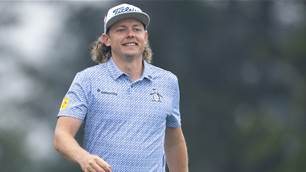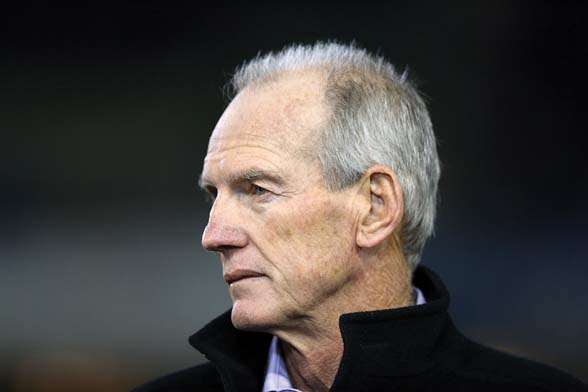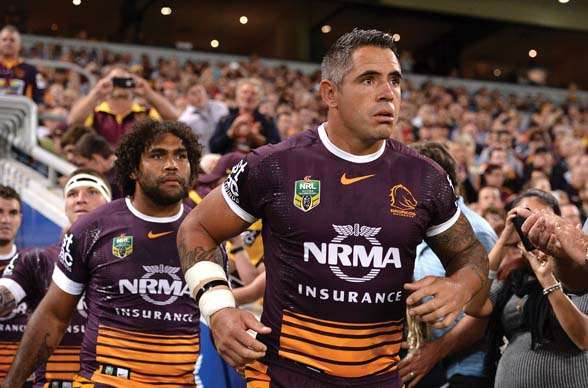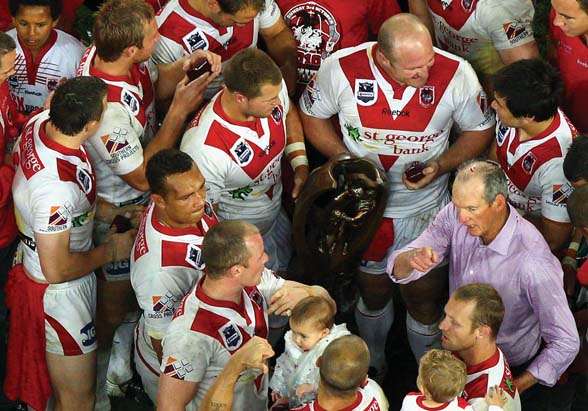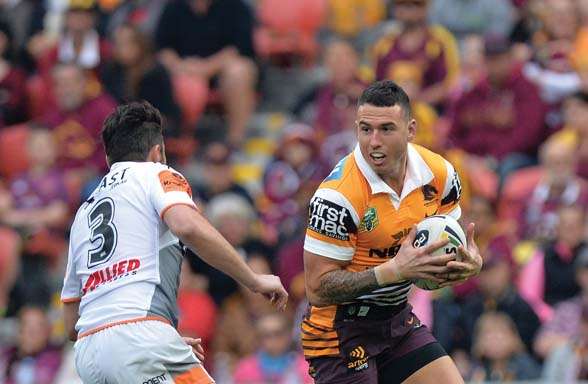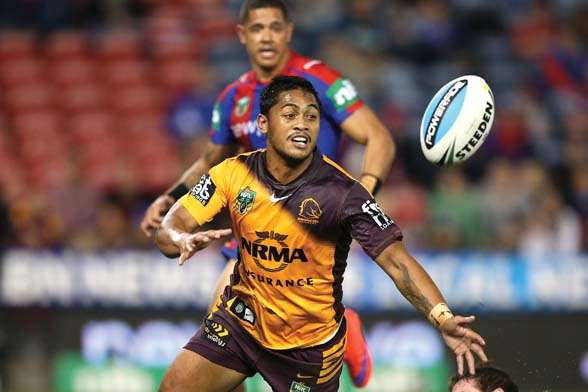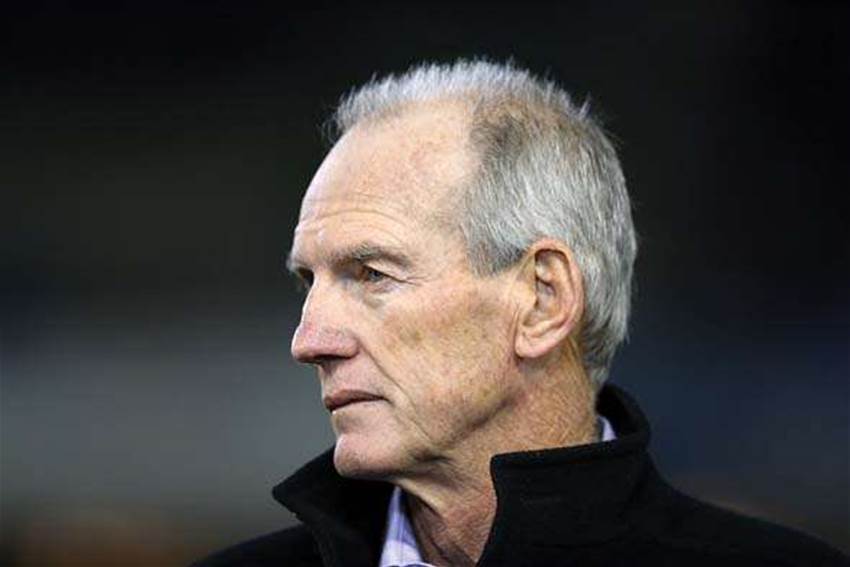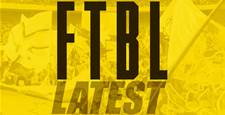How long before Brisbane returns to the winners' podium on grand final night?
To the Brisbane Broncos, State of Origin rugby league is a bit like a boozy session at the local on a Sunday afternoon. When it’s on, how good’s this – wouldn’t want to be anywhere else! But when the alarm sounds on Monday morning, it’s back to reality, with a boulder of a hangover to carry around for good measure. It’s been like this for the Broncos ever since they entered the comp back in the late eighties. In 2006, for example, the post-Origin fade hit them seriously hard. They’d lost either side of Game II, had regrouped as a club after the series, then dropped five matches in a row. How was veteran Brisbane coach Wayne Bennett going to get his men out of this? Wasn’t he their “super coach”, with the best winning record in the game and all that?
Bennett’s chosen course of action was to literally get them out of it. He took the unusual step of gifting his team a week off from training and all other club duties. It wasn’t even a bye week – they’d just had one of those following the first loss of their streak a few rounds back. As veteran captain Darren Lockyer would explain a few years later, in conversation with Rugby League Week magazine, he chose to take it relatively easy, staying close to home. “It was almost like a mid-season holiday; Some guys even went to Thailand ... ” Bennett didn’t care what his players did, or where they went, just as long as they weren’t doing footy. Locky recalls the media meltdown that followed: “The media were saying things like: ‘These guys aren’t taking it seriously. Why would you give them a week off?’”
So did Bennett’s tactic actually work, this non-footy plan back to footy success? The record shows that apart from a loss at home in the first week of the finals to St George-Illawarra, they didn’t drop another game. For the rest of the season. “In the short term, it probably had a negative impact in terms of little things; a couple of guys might’ve put a few kilos on in weight,” Lockyer recalled. “But in the long term, mentally, it was a great refresher.” The benefits of the controversial break showed when it mattered. On the eve of the semi-finals, the Broncos hit top gear, destroying the Bulldogs 30-0 and the Eels 23-0. They rounded-out the season by putting 36 past the Warriors in a 24-point thrashing. Offers co-host of popular Fox Sports discussion show NRL 360, Ben Ikin: “He’s not a tactical genius, but over 30-40 years of coaching, Wayne Bennett has figured out for himself that the way he likes to coach is what wins him footy games.”
Not that anyone could guess at the time, but minor premiers the Melbourne Storm, featuring veterans Matt Geyer and Scotty Hill, a much younger-than-now Cameron Smith and an embryonic Greg Inglis, didn’t really stand a chance in the title decider. The 2006 grand final was historic in that it was the first big dance in elite-level Australian rugby league not to feature at least one Sydney team. The locals soon got over that though, with 79,609 packing Homebush to watch one of the Broncos’ favourite sons, rampaging prop Shane Webcke, play his 254th and final NRL game. Ahead for most of the match, the Broncos won an engaging arm wrestle 15-8, sealing victory with a late Lockyer one-pointer. Defensively that night though, the Broncos were outstanding, executing their game plan to perfection. Bennett even smiled after that result, a trait the tall, terse figure isn’t exactly famous for. Pesky young scribes firing unchallenging questions at him post-match has never helped. And he’s always had a bit on his plate besides football. He grew up quickly. Had to. After his father deserted the family when he was ten years old, Wayne stepped up, helping his mother out, helping her get through ... life. A generation later, he’s been a brave, tough and loving parent for his two disabled children throughout their lives.
Back to footy, Bennett’s men were a settled but viperous unit back in 2006, with Lockyer, Webcke and Thorn into their 12th seasons, and Petero, Casey McGuire and hardman Tonie Carroll reaching their ninth. They were a bit lighter on for experience in the backs, but Brent Tate, Karmichael Hunt and Justin Hodges knew by then where the try line was. It all must’ve been a sensational blur for a kid like Darius Boyd, too. The 19-year-old winger only debuted in first grade that year and was living the thrill of what was surely the first of many grand finals to come for the Broncos. Except it wasn’t ...
CHANGE OF RIDERS
Wayne Bennett’s announcement that 2008 would be his last season at Brisbane was like God announcing his resignation from the Catholic Church. There was simply no such thing as a Wayne Bennett-less Broncos; after 21 seasons, he was still their foundation coach. To the fans sitting in the stands each week at Suncorp Stadium, he was like a father figure, even to Brisbane disciples who had fathers of their own. He was just ... the man in charge, and probably would be forever, like Sir Alex Ferguson at Manchester United or Kevin Sheedy at the Bombers.
Bennett’s departure from Brisbane was a good two years in the making, according to Queensland newspaper The Courier Mail, which reported in February ’08 that Broncos management had been miffed with Bennett since “it was revealed he had secretly brokered a deal to coach the Roosters” in 2006. Bennett was negotiating with a rival club, according to The Courier Mail, because he believed there were people at the Broncos weighing up a future without him. Bennett’s fear of not leaving enough financial support for the care required for his two disabled children in years to come has always burned brightly. Nonetheless, the relationship between Bennett and the club’s board was reportedly never the same again.
Christmas arrived early for the St George-Illawarra Dragons (and not the Roosters) in March 2008, when the joint venture announced they’d secured Bennett for three seasons. His arrival dramatically changed the way the red and whites went about things. He brought his own coaching support staff with him, part of a club-wide clean-out of players and key personnel. Because of Bennett, the Dragons enjoyed increased bargaining power at the player negotiation table, with names such as Darius Boyd, Jeremy Smith, Neville Costigan, veteran Luke Priddis and Mick Weyman bolstering the team for 2009 onwards.
Former coach Nathan Brown’s Dragons had finished 13th and seventh in the two seasons before Bennett’s arrival. Just two years down the track, their captain Ben Hornby was lifting rugby league’s ultimate prize, the Telstra Premiership. It happened that quickly. Many expected it to.
Back at the ranch, all eyes were on Brisbane’s former assistant coach, Ivan Henjak, who had been chosen for the job no one thought would ever be declared vacant. It turned out to be an outrageously successful 2009 for the maroon and golds. Sure, there was the routine post-Origin crash, but by season’s end, Henjak’s squad found itself in sixth spot heading into the finals. After play-off victories over the Titans, and even Wayne’s Dragons, Henjak’s men were eliminated by the Storm a week before the grand final. Not a bad year for a bloke replacing God.
The following season proved a parallel universe – a living hell – for the Broncos, where the reality of a Bennett-less Brisbane finally set in. Beginning with Justin Hodges’ season-ending Achilles’ injury, things deteriorated. Mid-year, Henjak’s megastar back, Israel Folau, announced he was transferring to Sydney to have a go at playing Aussie rules, and Darren Lockyer missed the end of the season through injury. On the positive side, the arrival of Storm behemoth Greg Inglis was not far away ... until he backflipped at season’s end.
The Broncos missed the finals that year for the first time since 1991. They finished tenth, their lowest end-of-season ladder position. Ever. In February 2011, a few months after Bennett’s Dragons lifted their trophy, Henjak lost his job to his assistant Anthony Griffin.
GOOD KNIGHT
“Private ownership appeals to me. I like it. This guy wants to take Newcastle to another level,” Wayne Bennett said of businessman Nathan Tinkler in April 2011 at the announcement of Bennett’s four-year deal with the Newcastle Knights. A month earlier, Tinkler and his Hunter Sports Group were unanimously approved to take over the embattled club’s finances and operations. Hiring Bennett was among Tinkler’s first moves, the super coach’s three-year deal with the Dragons expiring at season’s end. Making life slightly easier for the Knights during the appointment was the classy way in which their former mentor Rick Stone handled having his job description lowered from head coach to assistant, despite having guided the club through recent finals campaigns.
Bennett’s move to Newcastle went some way to silencing critics who had long sniggered that the secret to his success as a mentor was that he had never coached a battling club; that he’d always coached elite players. Sure, the Danny Buderus (now stand-in coach) and Kurt Gidley-led Knights back then were no minnows, but compared to his multi-premiership glamour boys at the Broncos, they needed a good polish. At a quick glance, Bennett’s record during his three-year Knights tenure is poor in comparison with his previous roles – 12th in both his first and third seasons. Those two weary campaigns book-ended a spirited crack in 2013, though. Finishing the regular season in seventh, his Knights made it all the way to the Preliminary Final before being knocked out by eventual premiers the Roosters the week before the decider. The Knights battled bravely without their club legend Buderus that night, who was stretchered from the field after being knocked out. It would be the last game of Buderus’ illustrious career, but the Knights would fight on ... for one more season with Wayne Bennett in charge, at least.
During Bennett’s service for the Knights, the likeable and dry-witted Anthony Griffin, like Henjak before him, took Brisbane to within one match of the grand final in his first season in charge, proving his ability to fill the chair once occupied by rugby league royalty. But relatively poor finishes (by Broncos’ standards) followed across 2012-14. In his second season at the helm, his team scored just 12 wins. They collected ten in his third and lost as many as they won in 2014. In the Hunter earlier that year, Tinkler withdrew from the Knights. He failed to renew a $10m bank guarantee, ending his ownership. Bennett still had a year to run on his original contract when it all hit the fan there, but had renegotiated his deal with the club when the NRL took over the reins. Discussions with the Broncos were underway. It was time to put the Brisbane band back together. The top job at Newcastle went back to Stone.
BACK ON TOP
“The feedback I’ve got from people who work there is, prior to Wayne coming home, they always still believed there was a really good attitude amongst the group,” former Bear, Bronco and Charger (and Bennett’s son-in-law) Ben Ikin shares of the Broncos during the 700-gamer’s absence.
“Whether it be at training or in games, the effort was always pretty much where they wanted it to be. They perhaps just lacked a little bit of the know-how, which is Wayne’s speciality. In a couple of conversations we’ve had, he’s said to me, ‘It’s not dissimilar here at Brisbane to when I arrived at the Dragons.’ Credit to the people who were at the Broncos before him, too. There were a lot of things being done well. But he’s just got that ability because he’s won so much and he’s been around so long. He’s experienced and knowledgeable enough to know what that extra five or ten percent looks like.”
There’s a nice synergy between the controversial career of Darius Boyd and the lifespan of the Brisbane Broncos. He was born the year before they were, was there for their last title, and will no doubt play a leading role in the charge towards another grand final appearance in the coming months. Boyd landed back at the Broncos after signing a three-year deal said to be worth around $1.2 million – money freed up thanks to the departures of Josh Hoffman to the Titans and Ben Barba to Cronulla. Despite only playing a handful of games since his return thanks to a freak Achilles’ injury at training in December, the fullback has provided an extra element of on-field professionalism to the Broncos’ young attack. His recent recovery from depression was documented by the ABC’s Australian Story earlier this year, the program revealing his battles with mental illness. Boyd would lock himself away for up to three days after a loss; probably needless to say during that time he lost his passion for the game and for being around it. That he self-admitted to a mental health clinic says more about the man than antics like one-word answers at press conferences or media brushes ever will.
The 28-year-old has played a tick over 200 career first grade games for the Broncos, Dragons and Newcastle, has represented Australia 17 times and played 23 State of Origins for Queensland. A consistent performer throughout his career, it can be argued that 2010 was his best season to date. He was judged the Dally M Fullback of the year, Rugby League international Federation Fullback of the Year, and picked up the Clive Churchill Medal for man of the match in St George-Illawarra’s grand final win over the Roosters. He has followed Bennett throughout his career, never having played an NRL game under any other coach. He’s copped plenty of flak from rival fans for that, but what he’s also happily copped is a couple of sparkling premiership rings ...
The Brisbane Broncos are enjoying their best season since 2006. This year they sailed through that often-daunting Origin period like never before, even smashing the Wests Tigers on the other side of it for good measure. Sitting pretty on top of the table for the first time since 2011, by round 20 they’d dropped just three games and clocked up 15 wins. It has been argued by many that the Broncos boast their best scrum base combo since Allan Langer and Kevin Walters in young star halves Ben Hunt and Anthony Milford. That’s debatable (it’s still early days for both of them), but it’s certainly the case that the team has never looked as composed or organised since the departure of 350-game veteran Darren Lockyer four seasons ago.
Ask those two kids the secret to their team’s success and they’d – knowing footy players – probably throw the credit baton in the direction of the team’s engine room, and they’d be right to do so. The Broncos have an extremely mobile and robust pack of forwards, every player capable of playing extended minutes. Until recently their big men were led by the ever-reliable Josh McGuire, who has been lost for the season through injury. His absence means the importance of enforcer Adam Blair intensifies. Blair seems to be rather enjoying the Brisbane air after his career coughed and spluttered during his time at Wests Tigers. The cheeky and skilful Alex Glenn seems to get better with experience, while out the back, young utility Corey Oates is setting the world on fire. The dynamic Jordan Kahu has “star of the future” written all over him as well.
The Broncos are about due for more glory, surely. Maybe overdue. They haven’t played in a grand final for eight seasons now, which in Brisbane years is an eternity. Whether their return to form is just because Bennett is back, who knows, but the fact is, he is back, and so are they, looking down on the field from the top of the table. It’s exactly how men like Barry Maranta, one of the club’s co-founders, had wanted it all along. “All your personnel have got to be good, and of course, getting Wayne Bennett was critical at the start for us,” Maranta – whose grandson Lachlan plays in the backs – recalled for Inside Sport. “Even back then, all the good judges and all our own assessments told us that Wayne was the person who was going to give us long-term success.”
Related Articles
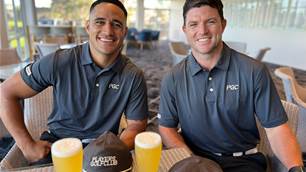
19 Holes With ... Chad Townsend and Val Holmes

Viva Las Vegas: Join Golf Australia magazine's Matt Cleary on a golf and rugby league spectacular
